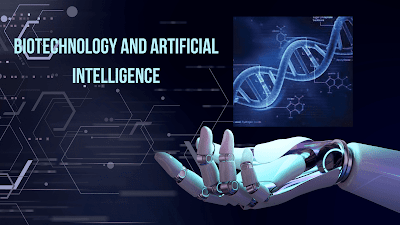Introduction
The
convergence of biotechnology and artificial intelligence (AI) has opened up new
frontiers in healthcare, offering unprecedented opportunities for improving
patient outcomes. Biotechnology harnesses the power of living systems to
develop innovative therapies, while AI empowers machines to simulate human
intelligence and perform complex tasks. In this article, we will explore the
synergistic potential of biotechnology and AI, their applications in
healthcare, and the transformative impact they have on diagnostics, drug
discovery, personalized medicine, and patient care.
The Role of AI in Biotechnology
1. Data Analysis and
Predictive Modeling: AI algorithms can analyze vast amounts of biological data, such
as genomic sequences, protein structures, and clinical records, to uncover
patterns, make predictions, and accelerate research. AI-powered predictive
modeling helps identify disease biomarkers, optimize treatment regimens, and
predict treatment outcomes.
2. Drug Discovery and
Development: AI techniques, such as machine learning and deep learning, have
revolutionized the drug discovery process. By analyzing large datasets and
molecular structures, AI algorithms can identify potential drug candidates,
predict their efficacy, and optimize their properties. AI accelerates the
screening of compounds, shortens the time for drug development, and reduces
costs.
3. Precision Medicine and
Personalized Treatment: AI algorithms can analyze patient-specific data, including
genomics, medical records, and imaging results, to tailor treatments to
individual patients. AI-powered decision support systems aid in diagnosis,
treatment selection, and monitoring of patient response, leading to more
precise and personalized care.
The Impact of Biotechnology and AI in Healthcare
1. Diagnostics and Imaging: Biotechnology combined
with AI has enhanced diagnostic accuracy and speed. AI algorithms can interpret
medical images, such as X-rays, MRIs, and CT scans, with high precision, aiding
in early detection and accurate diagnosis of diseases. Additionally, AI-powered
diagnostic tools enable real-time analysis of patient data, improving triage
decisions and optimizing resource allocation.
2. Genomics and Precision
Oncology:
Biotechnology and AI have transformed cancer care through precision oncology.
Genomic sequencing combined with AI analysis enables the identification of
genetic alterations and potential therapeutic targets in tumors. AI algorithms
can guide treatment selection, predict treatment response, and identify drug
resistance mechanisms, leading to more effective and personalized cancer
therapies.
3. Remote Patient
Monitoring and Telemedicine: Biotechnology and AI enable remote patient monitoring and
telemedicine, revolutionizing healthcare delivery. Wearable devices and sensors
collect real-time patient data, while AI algorithms analyze the data to detect
changes in health status and provide timely interventions. Telemedicine
platforms powered by AI facilitate remote consultations, improving access to
healthcare and reducing healthcare disparities.
4. Drug Repurposing and
Combination Therapies: Biotechnology and AI have accelerated the identification of drug
repurposing opportunities and the discovery of effective combination therapies.
AI algorithms can analyze vast databases of drug compounds and disease-related
data to identify existing drugs with potential new indications. This approach
expedites the discovery of treatments for rare diseases and provides more
options for patients.
Ethical Considerations and Challenges
The
integration of biotechnology and AI in healthcare raises important ethical
considerations:
1. Privacy and Data
Security:
The use of AI in healthcare relies on patient data, raising concerns about
privacy, data ownership, and protection against unauthorized access. Striking a
balance between data sharing for research purposes and protecting patient
privacy is crucial.
2. Bias and Fairness: AI algorithms can
inherit biases present in the data they are trained on, leading to biased
decision-making in healthcare. Ensuring fairness, transparency, and
accountability in AI algorithms is essential to avoid perpetuating healthcare
disparities.
3. Regulatory and Legal
Frameworks:
The rapid advancements in biotechnology and AI pose challenges for regulatory
bodies in keeping pace with emerging technologies. Developing appropriate
regulatory frameworks to ensure safety, efficacy, and ethical use of AI in
healthcare is vital.
4. Trust and Human
Oversight:
Building trust in AI systems and maintaining human oversight is critical to
ensure that AI is used as a tool to augment human capabilities rather than
replace human judgment. Collaboration between healthcare professionals and AI
systems is essential to provide the best possible care.
Conclusion
The
integration of biotechnology and AI holds immense promise for transforming
healthcare, improving diagnostics, accelerating drug discovery, enabling
personalized medicine, and enhancing patient care. The combination of
biotechnology's biological insights and AI's analytical power has the potential
to revolutionize disease prevention, diagnosis, and treatment. However, ethical
considerations, regulatory challenges, and the need for human oversight must be
addressed to fully harness the potential of this powerful alliance. With
ongoing advancements and responsible implementation, the collaboration between
biotechnology and AI will continue to shape the future of healthcare, leading
to better health outcomes and improved quality of life for patients worldwide.







0 Comments